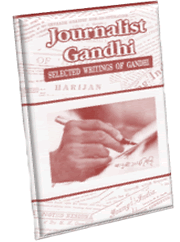
P.O. SEVAGRAM, DIST.WARDHA 442102, MS, INDIA. Phone: 91-7152-284753
FOUNDED BY MAHATMA GANDHI IN 1936
JOURNALIST GANDHI
Selected Writings of Gandhi

JOURNALIST GANDHI
(Selected Writings of Gandhi)
Table of Contents
- ON DEMOCRACY
- ON COMMUNALISM
- ON UNTOUCHABILITY
- ON MORALITY
- ON CASTE
- ON WOMEN
- ON HIS OWN LIFE
- ON RELIGION
- ON SWADESHI
- ON SOCIALIST
- ON CAPITALISM
- ON NON-VIOLENCE
- ON STUDENTS
- ON HIS SON
- ON SOCIAL SERVICE
- ON POLITICS
About This Book
Compiled by : T. K. Somaiya
Gandhi Book Center,
Bombay Sarvodaya Mandal,
299, Tardeo Road,
Nana Chowk, Mumbai 400 007
First Edition : August 1994
Published by : Jitendra T. Desai,
Navajivan Publishing House,
Ahemadabad - 380 014,
India
Printed by : Yash Printers
140/L, Kalbadevi Road,
Mumbai 400 002
India
Download
ON STUDENTS
Chapter 25: Students and Strikes
A college student or Bangalore writes:
"I have read your article in HARIJAN and request you to let me know your opinion on students taking part in strikes like Andamans Day, Abattoir Day, etc.,"
Whilst have pleaded for the removal of restrictions on the speech and movements of students, I am not able to support political strikes or demonstrations. Students should have the greatest freedom of expression and of opinion. They may openly sympathize with any political party they like. But in any opinion they may not have freedom of action whilst they are studying. A student cannot be an active politician and pursue his studies at the same time. It is difficult to draw hard and fast lines at the time of big national upheavals. Then they do not strike or, if the word 'strike' can be used in such circumstances, it is a wholesale strike; it is a suspension of studies. Thus what may appear to be an exception is not one in reality.
As a matter of fact the question such as the correspondent has raised should not arise in the Congress Provinces. For there can be no curb which the best mind of the students will not willingly accept. The majority of them are, must be, Congress-minded. They may not do anything that would embarrass the Ministries. If they struck, they would do so because the Ministers wanted them to. But cannot conceive of Congress Ministers wanting them to strike except when the Congress is no longer in office, and when the Congress declares, maybe, a nonviolent active war against the Government of the day. And even then, I should think that to invite students in the first instance to suspend their studies for strikes would be tantamount to a declaration of bankruptcy. If the people in general are with the Congress for any demonstration in the nature of strikes, students will be left alone except as a last resort. During the last war the students were not the first to be called out but they were the last so far as recollect, and then only college students.
But another correspondent writes in connection with it:
"If we allow paid State officials, teachers and others to participate in politics, it would become a hell. No Government could be carried on, if their policies are subjected to debates among Government or other State officials who have to carry them out. Your desire that national hopes, desires and ideas of patriotism should have free play is of course proper. But I fear your article is likely to be misunderstood unless you make your position quite clear."
I had thought that my position was quite clear. Where there is a national Government there is rarely any friction between it and its officials or the students. My note guards itself against all indiscipline. What the schoolmaster resents, and rightly, is espionage and suppression of free thought which has been the rule of the day hitherto. Congress Ministers themselves are of the people and from the people. They have no secrets. They are expected to be in personal touch with every public activity including the student mind. They have at their disposal the whole of the Congress machinery which, as the interpreter of the popular will, is surely more than the law, the police and the military. Those who have not that machinery to back them are spent bullets. For those Ministers who have the Congress at their back, the law, the police and the military may be said to be a useless appendage. And the Congress is nothing if it is not an embodiment of discipline. Therefore with the Congress in power there should be voluntary, not forced, discipline everywhere.
Harijan 2-10-1937